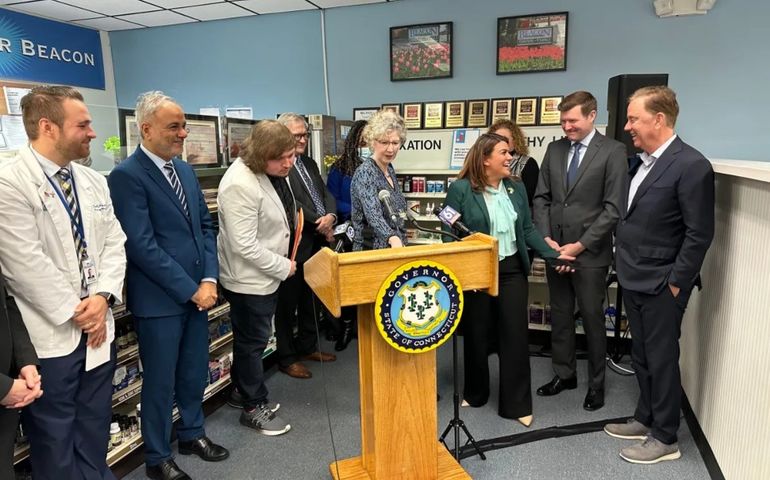Processing Your Payment
Please do not leave this page until complete. This can take a few moments.
-
News
-
Editions
-
- Lists
-
Viewpoints
-
HBJ Events
-
Event Info
- 2024 Economic Outlook Webinar Presented by: NBT Bank
- Best Places to Work in Connecticut 2024
- Top 25 Women In Business Awards 2024
- Connecticut's Family Business Awards 2024
- What's Your Story? A Small Business Giveaway 2024 Presented By: Torrington Savings Bank
- 40 Under Forty Awards 2024
- C-Suite and Lifetime Achievement Awards 2024
- Connecticut's Health Care Heroes Awards 2024
-
-
Business Calendar
-
Custom Content
- News
-
Editions
View Digital Editions
Biweekly Issues
- April 29, 2024
- April 15, 2024
- April 1, 2024
- March 18, 2024
- March 4, 2024
- February 19, 2024
- February 5, 2024
- January 22, 2024
- January 8, 2024
- + More
Special Editions
- Lists
- Viewpoints
-
HBJ Events
Event Info
- View all Events
- 2024 Economic Outlook Webinar Presented by: NBT Bank
- Best Places to Work in Connecticut 2024
- Top 25 Women In Business Awards 2024
- Connecticut's Family Business Awards 2024
- What's Your Story? A Small Business Giveaway 2024 Presented By: Torrington Savings Bank
- 40 Under Forty Awards 2024
- C-Suite and Lifetime Achievement Awards 2024
- Connecticut's Health Care Heroes Awards 2024
Award Honorees
- Business Calendar
- Custom Content
Lamont administration takes aim at hospital and drug costs
 MARK PAZNIOKAS / CTMIRROR.ORG
New Britain Mayor Erin Stewart chats with Comptroller Sean Scanlon and Gov. Ned Lamont before a news conference. Deidre Gifford, center, is the governor's health policy adviser.
MARK PAZNIOKAS / CTMIRROR.ORG
New Britain Mayor Erin Stewart chats with Comptroller Sean Scanlon and Gov. Ned Lamont before a news conference. Deidre Gifford, center, is the governor's health policy adviser.
Gov. Ned Lamont addressed rising health costs and hospital consolidation Tuesday with two bills that put a free-market governor at odds with Big Pharma and a hospital industry that is a major employer throughout Connecticut.
“When the market is not working, states can take action,” said Dr. Deidre Gifford, the physician and health-care cost expert who advises the governor on health issues as the executive director of the Office of Health Strategies.
At a press conference in a crowded corner of an independent pharmacy in New Britain, the governor took the first public steps towards passage of two administration bills addressing the related issues of costs and competition.
The measures include a ban on outpatient facility fees that cost Connecticut consumers $400 million annually, a cap on out-of-network patient costs, a ban on anti-competitive language and a commitment to join a multi-state program that offers lower prices through the bulk purchase of generic drugs.
“The system is broken,” Lamont said, standing with consumers, a pharmacist and others who described patients self-rationing drugs, risking their health to save money for other household necessities.
“Our patients and citizens of this state should not have to go without medications,” said Daniel Michalak, the pharmacy manager at Beacon Prescriptions. “They have tough choices between bills, food and shelter. Medication should not be skipped due to financial struggles.”
The roll out came on a day when one of the two measures, Senate Bill 983, was up for a public hearing before the legislature’s Insurance and Real Estate Committee, where the hospitals lined up in opposition. The other measure, House Bill 6669, is before the Public Health Committee.
In written testimony echoing points made by individual hospitals and systems, the Connecticut Hospital Association cast the cost-containment efforts as a boon to insurers and a burden on hospitals. The four national health insurers operating in Connecticut made between $4.1 billion and $20.1 billion in profits in 2022, the CHA said.
“Nothing in SB 983 would require these companies to pass on the savings generated by these government-imposed price caps to consumers,” the CHA said.
Delayed by an interruption in web service necessary for hearings that are required to simultaneously occur virtually and in person, the hearing was expected to stretch into the evening.
A willingness to fight with the hospitals is a departure for a governor who managed in 2019, his first year in office, to resolve a long-running tax battle with the industry opened by his predecessor, then worked closely with hospitals when COVID-19 threatened to overwhelm the system.
Gifford, whom Lamont hired as the commissioner of social services, then moved her in December to a broader role at the Office of Health Strategies, said the state must act in face of crushing health costs.
“The United States spends more than twice per person on health care than the rest of the developed world,” Gifford said. “And furthermore, our health outcomes are not as good as many other countries that spend far less. Medical debt is the No. 1 cause of personal bankruptcy in the United States. Think about that. Health care costs are driving people into bankruptcy, with all of the disruption and the physical and emotional stress that goes along with it.”
Lamont said the legislation outlined Tuesday is an outgrowth of Gifford’s new assignment. While the task of providing universal and affordable health care is a national issue, there is a significant role for the states in cost containment.
“Here in Connecticut, I want to do everything I can to deal with the underlying health care costs,” Lamont said. “I want to make sure that all the pharmacists here at Beacon have all the tools you need to make sure that I can get the right prescription at the best value for folks.”
The administration is working with Sean Scanlon, who oversees the administration of health coverage to state employees as the newly elected state comptroller. Lamont’s legislation would authorize Scanlon to pursue his idea of having Connecticut join with Nevada, Oregon and Washington in Array RX, a program to lower generic drug prices through bulk purchases.
“Obviously, I think that there are a lot of solutions at the national level that I wish we could see happen,” Scanlon said. “But because of the gridlock in Washington, it’s up to states like Connecticut to act, and, thankfully, the governor is acting. This team is acting.”
The legislation comes at a time of expansion and acquisition by the state’s two largest hospital systems, Hartford HealthCare and Yale-New Haven.
“Health system consolidation has led to some improvements in efficiency and coordination, but the evidence is clear that it’s also led to price increases,” Gifford said. “Large health care systems increase their bargaining power with insurers and make it difficult to maintain reasonable prices. So to increase competition and make a more level playing field, SB 983 will ban contracting terms that allow health care monopolies to stifle competition and increase prices.”
Dr. James Cardon, the executive vice president of Hartford HealthCare, submitted testimony calling the proposal for an out-of-network rate cap a “legislative disruption of the commercial contracting process” that will disadvantage the hospitals and quality of health care.
The bill would cap the rate at 100% of the Medicare reimbursement rate, which hospital administrators said was too low.
“This would undermine good‐faith negotiation between hospitals and commercial insurers,” said Patrick Charmel, the chief executive officer of Griffin Health in Derby. “The provision would provide a perverse incentive for commercial insurers to offer rates that are well below those prevailing in the market knowing that if the hospital refused those substandard rates, the hospital would lose its participating provider status and be forced to bill the patient/insurer as an ‘out of network’ provider and then accept even lower rates, which would not be financially feasible given that they would not cover the hospital’s cost of providing care.”
But Ellen Andrews of the Connecticut Health Policy Project said market changes have made the case for the legislation proposed by Lamont.
“In sum, Connecticut’s health care markets are increasingly consolidated and less competitive, driving up prices and premiums, reducing access to care, with no improvement in quality. SB 983 and HB 6620 can level the playing field, support competition, lower premiums, support value-based purchasing, improve access to critical services such as birthing centers and overcrowded emergency departments, and reduce overall health care costs.”
Gifford said she expected negotiations would follow Tuesday’s roll out, but she said costs cannot be contained without addressing prescription prices and hospital costs.
“The main drivers of increasing health care costs continue to be hospital inpatient charges, hospital outpatient charges and the cost of drugs,” Gifford said. “We will only be successful in tackling our long term health care costs if we tackle those three issues.”

2022 Giving Guide
This special edition informs and connects businesses with nonprofit organizations that are aligned with what they care about. Each nonprofit profile provides a crisp snapshot of the organization’s mission, goals, area of service, giving and volunteer opportunities and board leadership.
Learn more
Subscribe
Hartford Business Journal provides the top coverage of news, trends, data, politics and personalities of the area’s business community. Get the news and information you need from the award-winning writers at HBJ. Don’t miss out - subscribe today.
Subscribe
2024 Book of Lists
Delivering Vital Marketplace Content and Context to Senior Decision Makers Throughout Greater Hartford and the State ... All Year Long!
Read Here-
2022 Giving Guide
This special edition informs and connects businesses with nonprofit organizations that are aligned with what they care about. Each nonprofit profile provides a crisp snapshot of the organization’s mission, goals, area of service, giving and volunteer opportunities and board leadership.
-
Subscribe
Hartford Business Journal provides the top coverage of news, trends, data, politics and personalities of the area’s business community. Get the news and information you need from the award-winning writers at HBJ. Don’t miss out - subscribe today.
-
2024 Book of Lists
Delivering Vital Marketplace Content and Context to Senior Decision Makers Throughout Greater Hartford and the State ... All Year Long!
ABOUT
ADVERTISE
NEW ENGLAND BUSINESS MEDIA SITES
No articles left
Get access now
In order to use this feature, we need some information from you. You can also login or register for a free account.
By clicking submit you are agreeing to our cookie usage and Privacy Policy
Already have an account? Login
Already have an account? Login
Want to create an account? Register
Get access now
In order to use this feature, we need some information from you. You can also login or register for a free account.
By clicking submit you are agreeing to our cookie usage and Privacy Policy
Already have an account? Login
Already have an account? Login
Want to create an account? Register






0 Comments